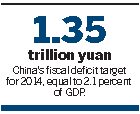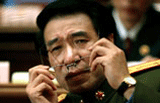Economists call for increased public spending
Updated: 2014-12-08 04:35
By Zheng Yangpeng(China Daily)
|
||||||||
Annual work conference will set tone for 2015 fiscal policy
Economists are calling for more proactive fiscal policies to counter the deepening slowdown in growth, as China's annual Central Economic Work Conference is set to start on Tuesday.

The meeting, usually held in early December, sets the tone for next year's macroeconomic policy.
Gao Peiyong, director of the National Academy of Economic Strategy under the Chinese Academy of Social Sciences, told a recent forum that a larger budget deficit is likely.
Assuming 7 percent GDP growth in 2015, Gao said, the deficit would be between 1.35 trillion ($220 billion) and 1.9 trillion yuan.
China set a 1.35 trillion yuan fiscal deficit target for this year, about 2.1 percent of GDP — still modest compared with international standards — but 150 billion yuan more than 2013.
Li Xunlei, chief economist at Haitong Securities, is expecting the deficit ratio to rise to 1.7 trillion yuan, or 2.5 percent of GDP.
Xu Gao, chief economist at Everbright Securities, argues that the country's fiscal policy could be bolder with a deficit of at least 2 trillion yuan.
"Fiscal policy should assume a larger responsibility in stabilizing the growth rate," Xu said.
Xu's comment is not new.
Chinese economists have been suggesting a more active fiscal policy for years, saying the government has been conservative in expanding its deficit.
It has run a deficit of under 2 percent for four of the past eight years, and even at the height of the global financial crisis in 2009 China ran a deficit of 2.8 percent.
The European Union has set a 3 percent upper limit for its member economies.
Several recent signs have shown policymakers are already taking note.
The National Development and Reform Commission, the top economic planner, has approved 28 railway projects in the past month and a half alone, pushing the whole year's railway investment to nearly 1 trillion yuan.
The largest factor influencing projections for a larger deficit is the central government's move to curb borrowing and spending by local governments beyond that outlined in their budgets. Such off-budget spending has driven local government debt to a record high.
Provincial governments are involved in sizable off-budget capital spending through government-related enterprises, and China's fiscal deficit would be much higher if that spending was counted.
As the central government restricts off-budget spending, it has to allow for greater spending to appear on local government budgets, analysts said.
- Drivers lose government jobs in line with campaign to cut public spending
- Pingtan bans public spending on greeting cards
- Govt vows to further curb public spending
- Public spending fans luxury prices
- Time to update mindset on public spending and revenue
- Public spending
- China's public spending to exceed $133b this year

 China, Brazil pledge to promote science, technology co-op
China, Brazil pledge to promote science, technology co-op
 'Big' Peking opera staged in New York
'Big' Peking opera staged in New York
 ZTE, NBA team partners in business, charity
ZTE, NBA team partners in business, charity
 Jack Ma awarded Honorary Chairman of Zhejiang Chamber of Commerce
Jack Ma awarded Honorary Chairman of Zhejiang Chamber of Commerce
 2014 Yearender: Life underground
2014 Yearender: Life underground
 South China's 'little Africa'
South China's 'little Africa'
 Trending: Eiffel Tower replica in Hangzhou
Trending: Eiffel Tower replica in Hangzhou
 Detailed models made from rice and trash
Detailed models made from rice and trash
Most Viewed
Editor's Picks

|

|

|

|

|

|
Today's Top News
Illinois university signs agreements with Chinese college
ZTE, NBA team partners in business, charity
Chinese investors in Brazil told to avoid risks
Economists call for increased public spending in China
Xiaomi's smartphone tap into the US market
Peruvian product hit in Chinese market
Chinese role expected in Mexico's energy reform
Brazil film festival delights Beijing and Shanghai
US Weekly

|

|








